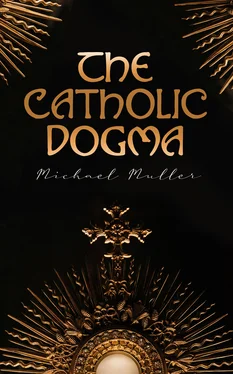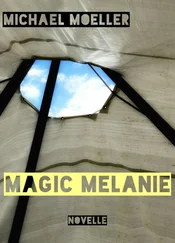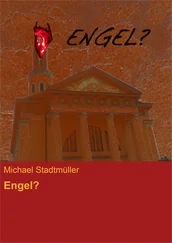Michael Müller - The Catholic Dogma
Здесь есть возможность читать онлайн «Michael Müller - The Catholic Dogma» — ознакомительный отрывок электронной книги совершенно бесплатно, а после прочтения отрывка купить полную версию. В некоторых случаях можно слушать аудио, скачать через торрент в формате fb2 и присутствует краткое содержание. Жанр: unrecognised, на английском языке. Описание произведения, (предисловие) а так же отзывы посетителей доступны на портале библиотеки ЛибКат.
- Название:The Catholic Dogma
- Автор:
- Жанр:
- Год:неизвестен
- ISBN:нет данных
- Рейтинг книги:4 / 5. Голосов: 1
-
Избранное:Добавить в избранное
- Отзывы:
-
Ваша оценка:
- 80
- 1
- 2
- 3
- 4
- 5
The Catholic Dogma: краткое содержание, описание и аннотация
Предлагаем к чтению аннотацию, описание, краткое содержание или предисловие (зависит от того, что написал сам автор книги «The Catholic Dogma»). Если вы не нашли необходимую информацию о книге — напишите в комментариях, мы постараемся отыскать её.
The Catholic Dogma — читать онлайн ознакомительный отрывок
Ниже представлен текст книги, разбитый по страницам. Система сохранения места последней прочитанной страницы, позволяет с удобством читать онлайн бесплатно книгу «The Catholic Dogma», без необходимости каждый раз заново искать на чём Вы остановились. Поставьте закладку, и сможете в любой момент перейти на страницу, на которой закончили чтение.
Интервал:
Закладка:
Now Lady Stafford had a great esteem for St. Francis de Sales. "If I could meet a bishop like him," she said, "I might become a Catholic." She had an interview with the Bishop of Amiens. At first, he avoided the subject of religion, and sought to gain her confidence. One day he asked her if her conscience was entirely at rest, if she had no doubts about her religion, living thus separated from the Church. "With the Bible in my hand," she answered, "I fear no one. I am quite satisfied." The words of the bishop, however, made a deep impression on her. She began to doubt seriously of the truth of her sect. She consulted the bishop. She heard one of his sermons, and conceived a great desire to be able to profess the same religious belief as this saintly prelate. She had yet some doubts about holy Mass and purgatory. She consulted the bishop once more. Instead of settling her doubts immediately, the bishop said: "Madame, you are acquainted with the Protestant Bishop of London. You have evidently great confidence in him. Go, then, and lay before him what I now tell you: The Bishop of Amiens declares that he will become a Protestant, if you can disprove the fact that St. Angustine, whom you regard as one of the greatest lights of the Church, offered up the holy Mass, and offered it up for the dead, viz., for his own deceased mother." The proposition was accepted. Lady Stafford begged her husband to go to London, and there, incognito, place the written message in the hands of the Protestant bishop, and bring back his written answer. The Protestant bishop read the message, and, on being requested to write an answer, he said: "This lady has fallen into bad hands; she will be perverted. Whatever I might say will not hinder the evil. A letter from me would only give rise to misunderstandings and unpleasant recriminations." As we may imagine, Lady Stafford was greatly surprised at this answer. She was sincere. It was evident that the bishop did not wish to answer, because he could not.
These two thoughts especially moved her to take the final step: "1. No Catholic ever became a Protestant in order to do penance for his sins, and to return to God, while many Protestants have become Catholics for this very reason.
"2. The Protestants honor as saints many doctors and fathers of the Church who taught a doctrine just the reverse of Protestantism; and, consequently, Protestants must admit that one can become a saint by imitating these holy doctors, and by living and dying in their belief. Lady Stafford made the spiritual exercises for a few days in a convent, and finally became a good, fervent Catholic." (Herbert.)
Like the London Protestant bishop, Bishop Coxe, too, knows that many non-Catholics have fallen into bad hands and became very edifying Catholics. He knows that good Catholic books, that clearly explain the Catholic religion, are also bad hands by which many non-Catholics have been converted to the Catholic Church. He knows that Familiar Explanation of Christian Doctrine is also one of those bad hands. To prevent non-Catholics from reading this little book, which proves so clearly that only the Roman Catholic Church is the true Church of Christ, and that no salvation is possible out of her, he takes from it a few questions and answers, dishonestly detached from the context, and twists them, as he does Holy Scripture, to his own destruction and to that of his neighbor.
We have not learned what Bishop Coxe has said on these questions and answers; but, to judge from the anonymous article Queer Explanation, we understand that he used them as arguments to denounce the idolatry and error of the Catholic religion.
It is not from conviction that Mr. Coxe declares the Catholic religion idolatrous and full of errors, for he knows too well that idolatry was abolished by the Catholic Church, and that, if it were not for her, he himself would be an idolater. If Coxe slanders the Spouse of Christ in a most impious manner, it is from devilish hatred to her. And why is it that he and many other Protestants entertain a devilish hatred to the Catholic Church?
"The so-called Reformers," says Dr. O. A. Brownson, "supposed at first that they could maintain dogmatic religion by means of the Bible, without any divinely authorized interpreter or teacher, for they were not aware at first how much their interpretation of Scripture depended on the tradition of the Church in which they had all been educated. When shown this by Catholics, and shown still further that the Bible, interpreted by tradition, supported the claims of the papacy and the Catholic Church, from which they had separated, they were forced, in order to be consistent with themselves, either to return to the Catholic Church or to reject the traditional interpretation of the written word, and to rely henceforth solely, in their interpretation of the sacred text, on grammar and lexicon. But interpreted solely by grammar and lexicon, it was soon discovered that no uniform and consistent dogmatic system could with any tolerable degree of certainty be educed from the Holy Scriptures. There is no denying the fact. The variations of Protestantism, even during the lives of the reformers, the multiplication of Protestant sects, all appealing alike to the sacred text, and the experience of three hundred and more years, render it indubitable. Hard pressed by their Catholic opponents, Protestants were driven to the sad alternative of either condemning their separation from the Church and returning to her communion, or of giving up dogmatic religion as unessential and falling back on interior feeling or sentiment.
"The reformers imagined that they had opposed a truth to the authority of the Church when they asserted the authority of the Bible; but in doing this they only changed the form of their denial. Their assertion of the authority of the Bible was purely negative, simply the denial of the authority of the Church to interpret it or declare and apply its sense. It meant neither more nor less; for the Church asserted and always had asserted the authority of the Bible, interpreted and applied by the divinely instituted court in the case. The Bible, Protestant experience has proved, without the Church as that court, is as unauthoritative as are the statutes of a kingdom or republic, left to the private judgment of the citizen or subject, without the civil court to interpret and apply them to the case in hand. They, then, did not oppose to the Church as the principle of their denial any truth or authority. Nothing but pure denial, historically as well as logically, Protestantism, in spite of every refuge or subterfuge, has reached its inevitable termination - the negation of all authority, external or internal, spiritual or secular, and therefore of all faith, of all objective truth, and of all religion; for the very nature of religion is to bind the conscience, or the obligation of man to obey God."
Hence St. Alphonsus says: "To reject the divine teaching of the Catholic Church is to reject the very basis of reason and revelation, for neither the principles of the one nor those of the other have any longer any solid support to rest on; they can then be interpreted by every one as he pleases; every one can deny all truths whatsoever he chooses to deny. I therefore repeat: If the divine teaching authority of the Church, and the obedience to it, are rejected, every error will be endorsed and must be tolerated." (Appendix to his work Council of Trent.) . "Indeed, by denying the very foundation of religion, or, rejecting revealed truth," says Brownson, "we deprive reason itself of its strength; and obscure its light. It ceases to be able to hold with a firm grasp the truth that lies in its own order, as is evinced by the immense intellectual superiority of Catholics over Protestants. Compare an Irish or Spanish peasant with an English or Protestant-German peasant, the learned Benedictines of St. Maur or the Bollandists, with your most erudite Protestant scholars and critics, or the great mediaeval doctors with your most lauded Protestant theologians. The difference in mental lucidity, acuteness, and strength is so great as to render all comparison almost ridiculous."
Читать дальшеИнтервал:
Закладка:
Похожие книги на «The Catholic Dogma»
Представляем Вашему вниманию похожие книги на «The Catholic Dogma» списком для выбора. Мы отобрали схожую по названию и смыслу литературу в надежде предоставить читателям больше вариантов отыскать новые, интересные, ещё непрочитанные произведения.
Обсуждение, отзывы о книге «The Catholic Dogma» и просто собственные мнения читателей. Оставьте ваши комментарии, напишите, что Вы думаете о произведении, его смысле или главных героях. Укажите что конкретно понравилось, а что нет, и почему Вы так считаете.












